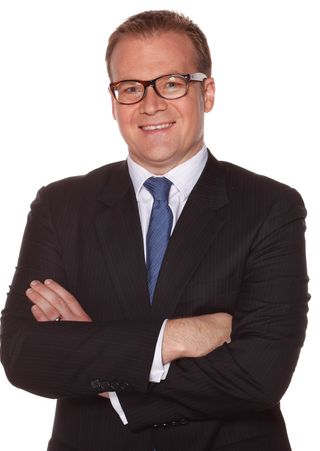ABC The Drum
He's a Tea Party favourite who can sound like a left winger and a Washington senator who is running against the DC machine. Meet Rand Paul, the second Republican to declare his candidacy for the US 2016 presidential election.
Senator Rand Paul of Kentucky has become the second Republican to formally declare his candidacy for President of the United States in 2016, following Senate colleague Ted Cruz. Like Cruz, Paul has attracted significant support from the conservative Tea Party movement which opposes big government and high taxes.
Making his announcement in Louisville, Kentucky, under a banner promising to "Defeat the Washington machine" and "Unleash the American Dream" Senator Paul looked every inch the conservative candidate, wearing the politicians' uniform of dark blue suit, blue shirt and red tie.
Rand Paul isn't a typical conservative. Yes, the 52-year-old will talk a lot about God, liberty and freedom and his opposition to abortion. But Rand Paul's version of restrained government extends into unexpected areas — like opposing most military intervention overseas and telling government to stay out of people's private lives. And in case you were wondering, the "Rand" is short for "Randall" not a homage to libertarian icon Ayn Rand.
Senator Paul can sound like a left-winger when he rails against surveillance by the National Security Agency (NSA) and has even signalled that he might be changing his opposition to same-sex marriage, (not because he likes the idea, mind, just that he doesn't think government should tell people who they can marry).
Rand Paul's politics are complicated, but are generally summed up as being libertarian. His father, former Texas Congressman Ron Paul ran for the Presidency himself three times, first as a Libertarian candidate in 1988, then seeking the Republican nomination in 2008 and 2012.
Ron Paul, a white-haired wiry curmudgeon, attracted an eclectic mix of supporters; he was just as likely to have college kids at his rallies as middle-aged white folks from Des Moines. In fact he usually had both. In 2008 Paul senior often shared supporters with the most left-wing anti-war Democrat, Congressman Dennis Kucinich of Ohio, who famously believed he'd seen a UFO from Shirley MacLaine's balcony.
Whether they were wearing dreadlocks or matching parkas, Ron Paul's supporters were passionate to the point of obsessive, and you suspected more than a few just might be wearing tin foil under their baseball hats to ward off the CIA, a paranoia fuelled by liberal use of "medical" marijuana.
Rand Paul, as a newly-elected Senator, campaigned with his father in 2011 and 2012. I met him at the Iowa state fair in August of that year as Ron Paul shook hands and slapped backs in between displays of farm machinery and fried food stalls. The younger Paul seemed pleasant enough, lean with reddish curly hair, pale Irish looks and slightly thyroidal eyes. He looked a lot like the ophthalmologist he was, rather than the Senator he'd become, much less the President he aspires to be. But for all his suburban ordinariness, he was quick, calm, and slightly wary — all the things an American politician should probably be when being quizzed by a foreign journalist.
We mostly talked about his father's chances of becoming the Republican nominee. Despite his diverse support base, Paul always seemed to hit a ceiling of about 10 – 15 per cent support in the state-based primaries which select the major party candidates. Many people assume that just as Rand Paul will inherit his father's dedicated band of followers, he will also inherit his in-built limit on support.
Both Pauls take positions on issues such as opposing military intervention which mainstream Republicans tend to reject. While their libertarianism strikes a chord with Tea Partiers and even middle-of-the-road Republicans, their tendency to stick to their principles rather than compromise can cause some concern in deal-cutting Washington DC. Paul senior was known as "Dr No" in Congress, and his son has been a chip off the old block in the Senate.
Rand Paul's campaign message will seek to make his rigidity a virtue, he will run against the ways of Washington and can claim genuine outsider credentials. However, like Ted Cruz, a short career based on voting "no" in the senate doesn't make for a glittering list of achievements. That's why many believe it will be a governor or former governor with a track record in executive government rather than legislative obstruction who will prevail in this nominating contest.
Rand Paul, like his father before him, knows that the bully pulpit of a presidential campaign can help shift a once-fringe ideology such as Libertarianism closer to the middle of conservative politics, but his challenge will to be to appeal to minds as well as hearts.
This article was originally published at ABC The Drum





